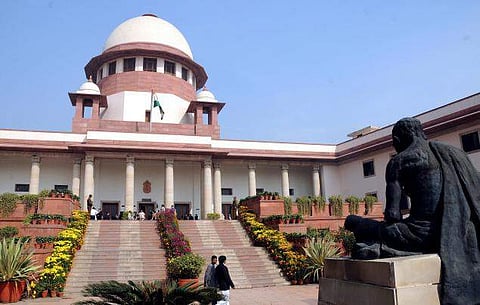

NEW DELHI: The Supreme Court today said it was treating the case relating to the death of special CBI judge B H Loya with "utmost seriousness" and considered it as a "cause" irrespective of what was said outside the courtroom.
A bench headed by Chief Justice Dipak Misra assured senior advocate Dushyant Dave that nobody can stop him from arguing the case and the top court was dealing the matter with "utmost care".
The court's remark came after Dave, who was appearing for Bombay Lawyers' Association, claimed that the Bar Council of India has recently issued show cause notice to him for arguing the case related to Loya's death.
Loya, who was hearing the high-profile Sohrabuddin Sheikh fake encounter case, had allegedly died of cardiac arrest in Nagpur on December 1, 2014 when he had gone to attend the wedding of a colleague's daughter.
"A member of judicial fraternity has died.
We are treating this case with utmost seriousness and considering it as a cause.
No matter what is said outside the courtroom, we will be doing our duty.
As far as we are concerned, we assure you nobody can stop you (Dave) from arguing this case," the bench, which also comprised Justices A M Khanwilkar and D Y Chandrachud, said.
"On the very first day, we have said that it was a matter of serious concern.
If there is some kind of suspicion, we will see if investigation is required," the bench said, adding, "if our conscience will be aroused, we can call for an inquiry.
" The observation came after Dave claimed that the counsel representing the petitioners in the case were under "pressure" despite the fact that they were persuing the case for a cause.
"One cannot imagine under how much pressure we are working.We are fighting this for a cause.It is too serious a matter. A judge has died under mysterious circumstances. We are working with our hands tied at the back.Things are not as it appears on surface," Dave told the bench.
The bench said the Bar Council of India was not before it as a party and Dave could argue in the matter with utmost liberty.
The senior counsel said he was just informing the bench about the notice and he would deal with it on his own as there was an attempt to "browbeat" the lawyers representing the petitioners.
He said during his career, he had never seen such a procedure adopted by the apex court and questioned the court's reluctance to issue notice to Maharashtra.
"The pleading needs to be completed in a matter of this magnitude as per the Supreme Court rules.
The statements of judges related to Loya's death have to be on oath and the court should direct them to file an affidavit," he said.
To this, the bench observed "affidavits will not improve your case. We are looking at present whether section 174 of CrPC was complied with or not.We have asked questions to you (Dave) as well as Mr (Mukul) Rohatgi (appearing for Maharashtra), if any facts arouse suspicion, we will do our duty."
Senior advocate Mukul Rohatgi opposed Dave's contention and said there were no such rules and the writ petitions were dismissed at threshold, even ex-parte, if they do not have merit.
Dave said a serving judge has died and it was a serious matter and if affidavits were not called, justice may not be served.
"Just because a person is holding a high legal position, that does not mean he can't file an affidavit," he added.
He said that "in a democracy everyone has a role. Judges have their own role and bar has their own role.
The four senior most judges - two sitting on the right side of this court and two on the left side - have expressed their reservation in Loya case".
Dave said that 114 Members of Parliament have recently petitioned the President for an SIT probe into Loya's death and it was nothing political.
"Even the civil society is raising questions on the issue. Pleading must be completed in the case and documents must be brought on oath," he said.
The bench also made it clear to Rohatgi that it would not accept any document or material which has not been served to the petitioners.
At the outset, Rohatgi said Loya had died an "accidental death" and there was nothing suspicious about the manner in which he was brought to the hospital or his body was taken to his native place.
He alleged that all the PILs before the apex court were based on the article published by a media house in November last year and "there was something fishy about it".
"All the PILs were filed after the article in November last year.
Why November? Because just couple of months back, this court had dismissed a petition challenging the discharge of a particular person (apparently referring to BJP chief Amit Shah).
The timing of the PILs raises question as nothing happened for three years after the death of judicial officer in 2014," Rohatgi said.
The hearing remained inconclusive and would continue on March 5.
The Maharashtra government had on February 12, told the apex court that the statements of four judges, who were with special CBI judge B H Loya on the last day of his life and had termed his death as "natural", were "unimpeachable".
It had said the statements of judges J Kulkarni, J Barde, J Modak and J R R Rathi, were unimpeachable that Loya's death was natural and unfortunate.
The bench is hearing pleas including those filed by Congress leader Tehseen Poonawala and Maharashtra-based B S Lone seeking an independent probe into Loya's death in 2014.
BJP president Amit Shah was an accused in the Soharabuddin Shaikh case, but was later discharged.